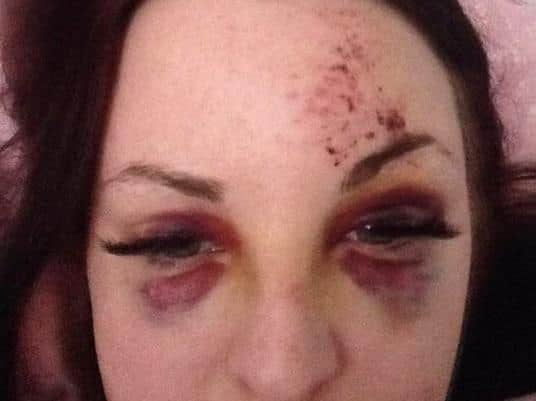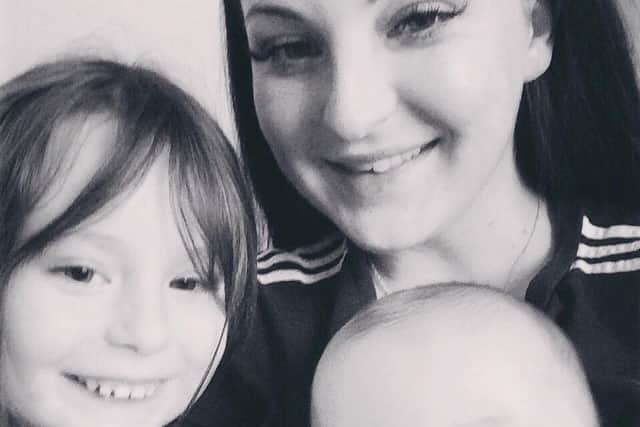'I was told I could have died': Leyland mum who had seizure raises awareness of her condition
and live on Freeview channel 276
But it was the help of a random stranger that could have saved her life - after she was left lying on the pavement beside the Chapel Brow roundabout, Leyland.
Andrea, 28, has suffered with epilepsy for four years and it has continuously caused barriers to her life as she says they happen "as and when" - sometimes as often as once a week.
Advertisement
Hide AdAdvertisement
Hide AdAnd on December 2, whist walking with two-year-old son Leo to pick up daughter Aime from school, Andrea suffered a seizure that caused her to black out.
Ambulance crews told her that a stranger had called the emergency services and stayed with her until they arrived
She said: "I had set off to get my daughter from school and usually feel dizzy feeling before I have a seizure. The best way I can describe it is like vertigo just before it is about to happen and I usually try and get as close to the ground as possible.
"I don't know what happened by I just passed out. I remember waking up and I was inside a barbers shop with a member of staff holding my head telling me I had banged it really badly. All I kept saying was that I couldn't hear anything and there was a ringing in my right ear.
Advertisement
Hide AdAdvertisement
Hide Ad"They told me someone had stopped and called an ambulance and then waited with me after seeing me hit my head but he had to rush off.


"It is so scary to think about because I had my two-year-old son with me. It made me panic when I came round because my son was crying and I had no idea what had happened."
Andrea goes to appointments twice a year to see her neurologist at Royal Preston Hospital but due to the changing nature of seizures, still doesn't know much about her condition but she makes a diary every day in a bid to work out what may be causing her painful seizures.
But he told her that if she had hit her head much harder - she could have died, as the injuries sustained can be fatal.
Advertisement
Hide AdAdvertisement
Hide AdShe suffers from tonic-clonic seizures, which make a person lose their consciousness, stiffen their muscles and suffer from sudden jerking movements.


They often leaves her gasping for air and her face and lips blue from lack of oxygen.
She said: "There are times I have been with my little girl and she has witnessed me have a seizure, but it is hard for her to understand and she gets upset about it.
"Usually the person who witnesses a seizure will stay with me after calling the ambulance, so I would like to thank whoever helped me last week as it could have been much worse.
Advertisement
Hide AdAdvertisement
Hide Ad"People don't know enough about epilepsy or how to handle the situation if someone has a seizure."
Andrea is now keen to raise awareness of the condition, that affects 600,000 people in the UK, with 87 diagnosed every day, according to Epilepsy Action.
The condition can start at any age and there are many different types - with it being a life-long struggle for many.
And she was hospitalised in 2018 after breaking her nose from a fall caused by one of her seizures.
Advertisement
Hide AdAdvertisement
Hide AdShe added: "It all started with blackouts and feeling sick. Normally, if a seizure is going to take place, people go into a daze, mumble to themselves and go extremely pale.
"It helps when people around don't panic and remain calm because when you eventually come round, it is like waking up from a dream."
Although suffering from convulsive seizures, there are many different types of seizures someone with epilepsy can suffer with including focal seizures and seizures in a wheelchair.
The official guidance is to cushion their head to protect them from injury and then stay with them until they are fully recovered and to be calmly reassuring.
Advertisement
Hide AdAdvertisement
Hide AdAn ambulance can be called if the episode lasts for longer than five minutes or if they are injured and you believe they require urgent medical assistance.
Find out more information from Epilepsy Action.
Thanks for reading. If you value what we do and are able to support us, a digital subscription is just £1 per month for the first two months. Try us today by clicking here.